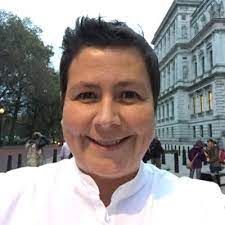By Lucy Caulkett-
Adult social care was not a priority in pandemic planning in the months leading up to the Covid outbreak, a senior government health official has said.
Ministers were aware in 2016 that “even a moderate pandemic would overrun the system” and the government’s emergency response function would be “very rapidly overwhelmed” by a major disease outbreak, the UK Covid-19 public inquiry has heard.
A meeting of the Department of Health and Social Care board, which included the permanent secretary, Sir Chris Wormald, and the then chief medical officer, Dame Sally Davies, concluded “there would be significant issues if it became necessary to track or quarantine thousands of people”, newly disclosed documents revealed.
However, the civil servant who subsequently took charge of emergency preparedness and health protection at the DHSC, Emma Reed,(PICTURED) said “there was no discussion with me about quarantining” and “there was no discussion with me about track and trace”.
Speaking at the Covid-19 Inquiry, Emma Reed, the director of emergency preparedness and health protection at the Department of Health and Social Care (DHSC), said while preparing the adult social care sector for an influenza pandemic was “important” it “was not a priority”.
On Monday, the inquiry was shown a document from the Pandemic Influenza Preparedness Programme (PiPP) board from November 2019 – months before the first coronavirus cases were recorded in the UK – which listed adult social care top in a list of “areas of work not prioritised for the next 6 months”.
Reed told the inquiry that it was more important that the adult social care sector prepared for a no-deal Brexit than for the risk of a flu pandemic.
Help us uncover the truth about Covid-19
The Covid-19 public inquiry is a historic chance to find out what really happened.
“My view at that time was preparing for a no-deal exit took precedence over completion of some of these pieces of work for a short period of time,” said Reed.
The inquiry has heard how the UK was over focused on preparing for a flu pandemic rather than a coronavirus pandemic, and that Operation Yellowhammer, a cross-government plan for a no-deal Brexit, diverted valuable resources in emergency preparation departments.
“My concern about the impact of adult social care as a result of a no-deal exit – a real incredible threat to that sector – was that that sector needed to prepare for and ready itself before a no-deal exit over the risk of a pandemic preparedness.”
Last week, deputy prime minister Oliver Dowden defended the UK’s focus on preparing for a no-deal Brexit rather than for a pandemic.
The inquiry also heard how preparations for a flu pandemic from 2011 considered the UK would run “business as usual”.
A document from the UK Influenza Pandemic Preparedness Strategy reads: “The UK Government does not plan to close borders, stop mass gatherings or impose controls on public transport during any pandemic.”
Reed said she was “not aware” of any conversation about closing borders or lockdowns.
Reed spoke during the first module of the Covid inquiry, which is seeking to explore the UK’s preparedness for the pandemic. Former health secretary Matt Hancock and former first minister of Scotland, Nicola Sturgeon will speak on Tuesday and Thursday this week.
The inquiry continues.




